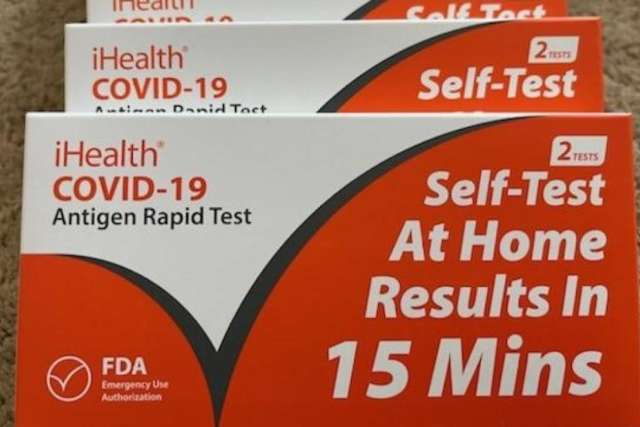Photo: Most COVID-19 tests need to be stored at temperatures of less than 86 degrees. (Photo by Sandy Cohen/UCLA Health)
The U.S. government has provided 16 free COVID-19 test kits per household to date, which means a small stockpile may be forming in the medicine cabinet.
But these rapid antigen tests don’t last forever. Results from an expired home-test kit may be unreliable, says Omai Garner, PhD, director of clinical microbiology for UCLA Health.
“Once they’re past expiration, we just don’t know how they’re going to perform,” says Dr. Garner, adding that the tests could yield false positives or false negatives. “It’s best to look at the expiration date and if they’re past expiration, make sure you throw them away.”
It’s likely that the solution used to identify viral proteins in the nasal swab sample loses effectiveness with time, Dr. Garner says. The amount of time a test is good for varies by manufacturer – some expiration dates may be six months or a year after production; others may be much less.
Storage temperature matters
COVID-19 antigen test kits are temperature-sensitive, too — something important to remember as summer weather heats up. Most COVID tests need to be stored at temperatures of less than 86 degrees.
“That’s no problem if they’re in your temperature-controlled house,” Dr. Garner says. “But if you’re keeping them in the trunk of your car or keeping them in an outdoor storage shed — the temperatures in Los Angeles can easily go over 100 in the summer and that would make the tests not perform correctly.”
Even allowing test kits to sit in your mailbox on a hot afternoon until you get home from work would make them unusable, he says. Heat damages the chemicals used to identify viral proteins.
“These tests aren’t to be outside the temperature window at all, period,” he says.
Some test kits can be refrigerated; others can’t, Dr. Garner notes. Temperature specs are noted on the package.
Is an expired test better than no test?
If cases are surging and test kits aren’t easy to come by, it could make sense to use a recently expired test. A kit that expires on June 27, for example, is probably still good on June 28, Dr. Garner says.
“If we’re surging and you have some recently expired kits, of course that’s going to be better than no test at all,” he says. “But if we’re not surging and you could just go to the store and get another set of tests, it’s better to do that.”
When should I test?
Home test kits are antigen tests, which use a nasal swab sample and a reagent solution to identify proteins specific to COVID-19.
In individuals who are vaccinated and boosted, however, it may take a few days of infection before viral proteins reach a level detectable by an antigen test.
“There’s high enough virus count to be contagious, but not high enough to get one of these tests to work,” Dr. Garner says.
People who have been vaccinated and boosted and have symptoms of COVID-19 should plan to test twice. If a symptomatic person performs an antigen test and the results are negative, Dr. Garner recommends retesting 48 hours later.
“That’s why they come in packs of two,” he says. “If the second test comes back negative, you can feel pretty confident that you don’t have COVID-19.”
The PCR test remains the “gold standard” for identifying COVID-19 infection, Dr. Garner says. This lab-performed test, also based on a nasal swab, can detect the virus while viral levels are still emerging.
Get the latest information about the COVID-19 virus and vaccines.



